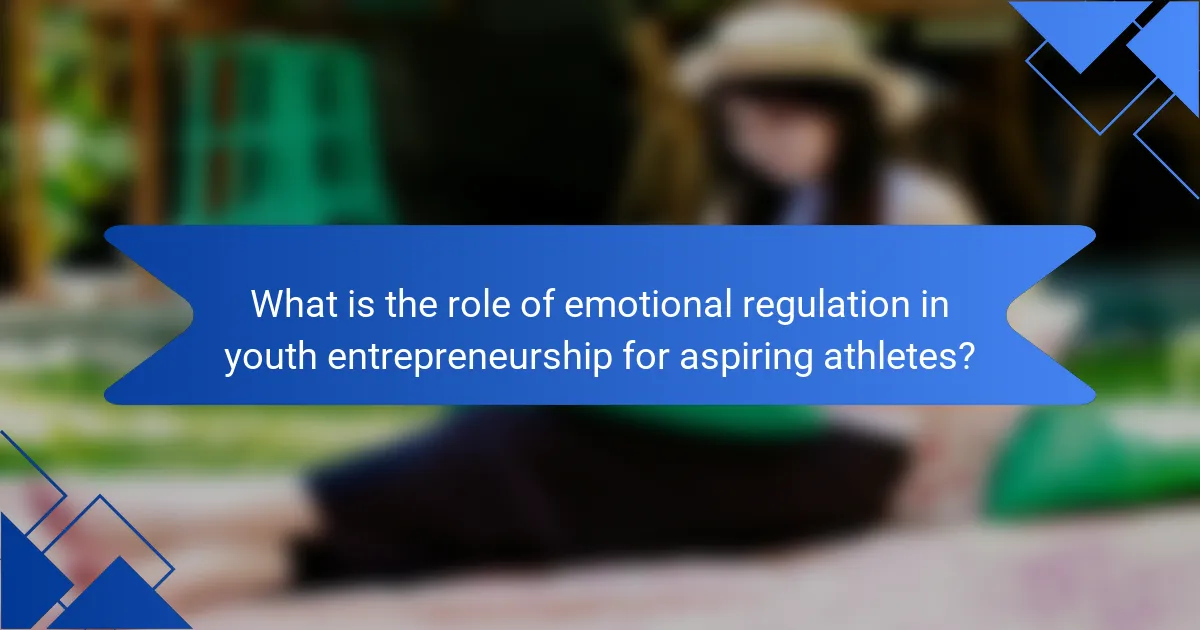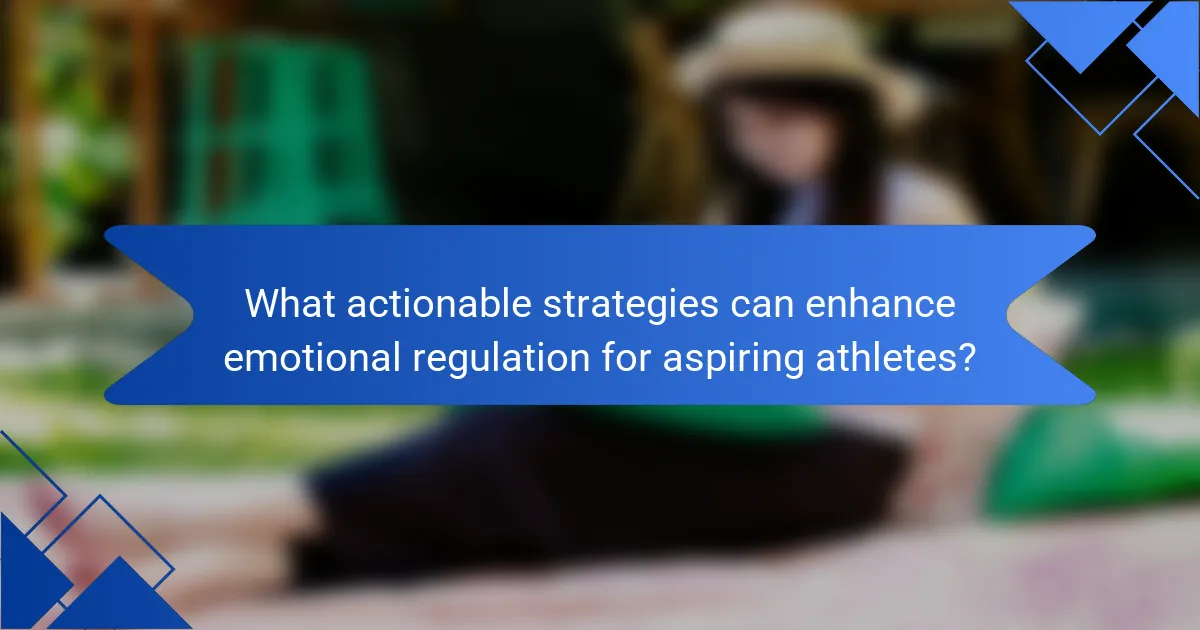Emotional regulation is essential for aspiring athletes in major sports, enhancing their decision-making and resilience. This article explores the importance of emotional regulation in youth entrepreneurship support, highlighting mentorship programs, resilience training, and mindfulness practices. It also examines rare attributes like adaptive resilience and emotional granularity, which improve coping strategies. Finally, effective techniques such as structured goal-setting and emotional awareness training are discussed to empower young athletes.

What is the role of emotional regulation in youth entrepreneurship for aspiring athletes?
Emotional regulation is crucial for youth entrepreneurship in aspiring athletes as it enhances decision-making and resilience. Effective emotional regulation helps athletes manage stress, maintain focus, and adapt to challenges, ultimately fostering a positive entrepreneurial mindset. Studies show that youth with strong emotional regulation skills are more likely to succeed in both sports and business ventures. This dual success can lead to unique opportunities, such as sponsorships and partnerships, further reinforcing the importance of emotional intelligence in competitive environments.
How does emotional regulation impact performance in major sports?
Emotional regulation significantly enhances performance in major sports by improving focus and resilience. Athletes who effectively manage their emotions can maintain composure under pressure, leading to better decision-making and execution of skills. Research indicates that emotional regulation strategies, such as mindfulness and cognitive restructuring, can reduce anxiety levels, thereby increasing overall performance metrics. Furthermore, youth entrepreneurship support programs that emphasize emotional regulation can cultivate these essential skills, preparing aspiring athletes for the competitive landscape of major sports.
What are the key emotional regulation strategies for young athletes?
Key emotional regulation strategies for young athletes include mindfulness, cognitive restructuring, and goal setting. Mindfulness helps athletes stay present, reducing anxiety and enhancing focus. Cognitive restructuring aids in reframing negative thoughts, promoting a positive mindset. Goal setting fosters motivation and provides a clear path for achievement, enhancing emotional resilience.
How can mindfulness practices enhance emotional regulation?
Mindfulness practices significantly enhance emotional regulation for aspiring athletes. By fostering self-awareness, athletes can better recognize and manage their emotions during high-pressure situations. Techniques such as meditation and focused breathing reduce anxiety, leading to improved focus and performance. Research indicates that regular mindfulness practice can increase resilience, enabling athletes to recover from setbacks more effectively. This emotional stability is crucial in major sports, where mental fortitude often determines success.
What cognitive-behavioral techniques support emotional regulation?
Cognitive-behavioral techniques significantly enhance emotional regulation for aspiring athletes. Techniques such as cognitive restructuring, mindfulness, and exposure therapy help youth manage their emotions effectively. Cognitive restructuring allows athletes to challenge negative thoughts, promoting a positive mindset. Mindfulness practices enhance awareness of emotions, fostering better responses under pressure. Exposure therapy gradually desensitizes athletes to anxiety-inducing situations, improving their emotional resilience. These techniques collectively support emotional stability, crucial for success in major sports.
What are the universal benefits of emotional regulation in sports?
Emotional regulation in sports enhances performance, resilience, and mental health for aspiring athletes. It fosters focus, reduces anxiety, and improves decision-making under pressure. Athletes with strong emotional regulation skills exhibit better teamwork and communication, crucial for major sports. Research indicates that youth athletes who practice emotional regulation techniques experience increased motivation and satisfaction in their sport, leading to long-term engagement.
How does emotional regulation contribute to resilience?
Emotional regulation significantly enhances resilience in aspiring athletes by helping them manage stress and maintain focus. Effective emotional regulation allows athletes to navigate challenges, reducing anxiety during competitions. Studies indicate that athletes with strong emotional regulation skills experience improved performance and mental well-being. This skill set fosters persistence and adaptability, essential traits for overcoming setbacks in sports.
What role does emotional regulation play in team dynamics?
Emotional regulation significantly enhances team dynamics by fostering collaboration and reducing conflict. Aspiring athletes benefit from improved emotional control, which promotes effective communication and trust among team members. This skill enables individuals to manage stress and maintain focus during high-pressure situations, essential in major sports. Research shows that teams with high emotional regulation perform better, showcasing the importance of this attribute in youth entrepreneurship support initiatives for athletes.

What unique attributes enhance emotional regulation systems in sports?
Unique attributes that enhance emotional regulation systems in sports include mentorship programs, resilience training, and mindfulness practices. These elements foster emotional intelligence, enabling athletes to manage stress and maintain focus under pressure. Research shows that athletes with strong emotional regulation skills perform better and experience lower anxiety levels. Integrating these unique attributes into youth entrepreneurship support can empower aspiring athletes to thrive in competitive environments.
How does mentorship influence emotional regulation in young athletes?
Mentorship significantly enhances emotional regulation in young athletes by providing guidance and support. Effective mentorship fosters resilience, helping athletes manage stress and anxiety during competition. Research shows that athletes with mentors exhibit improved emotional control, leading to better performance outcomes. Additionally, mentors teach coping strategies and encourage positive self-talk, reinforcing emotional stability. This relationship cultivates a supportive environment, essential for personal and athletic growth.
What unique programs exist to support emotional regulation in sports?
Programs that enhance emotional regulation for aspiring athletes include mindfulness training, cognitive-behavioral therapy, and sports psychology workshops. These initiatives focus on developing self-awareness, coping strategies, and resilience. For instance, mindfulness training helps athletes manage stress through meditation and breathing exercises. Cognitive-behavioral therapy addresses negative thought patterns, fostering a positive mindset. Sports psychology workshops provide practical tools for emotional regulation, improving performance under pressure. These unique programs support athletes’ mental health, contributing to their overall success in major sports.

What rare attributes can be found in emotional regulation systems?
Emotional regulation systems in youth entrepreneurship support for aspiring athletes can exhibit rare attributes such as adaptive resilience, which enables individuals to recover from setbacks quickly. Another rare attribute is emotional granularity, allowing athletes to differentiate between various emotions and respond appropriately. These attributes enhance decision-making and coping strategies, ultimately fostering a healthier entrepreneurial mindset.
How do cultural differences affect emotional regulation in sports?
Cultural differences significantly influence emotional regulation in sports. Athletes from diverse backgrounds exhibit varying coping strategies and emotional responses during competition.
For instance, collectivist cultures often emphasize teamwork and community support, fostering emotional resilience. In contrast, individualistic cultures may prioritize personal achievement, leading to different emotional management techniques.
Research indicates that athletes familiar with their cultural norms are better equipped to handle stress and anxiety in high-pressure situations. This understanding can enhance emotional regulation, ultimately improving performance.
Training programs that incorporate cultural awareness can further support aspiring athletes in developing effective emotional regulation skills tailored to their backgrounds.
What innovative technologies are being used to support emotional regulation?
Innovative technologies supporting emotional regulation include wearable devices, mobile applications, and virtual reality environments. Wearable devices track physiological signals, providing real-time feedback to users. Mobile applications offer guided mindfulness exercises tailored for athletes. Virtual reality environments simulate competitive scenarios, helping users practice emotional responses. These technologies enhance resilience and coping strategies, crucial for aspiring athletes.
What are the challenges faced by aspiring athletes in emotional regulation?
Aspiring athletes face significant challenges in emotional regulation, impacting their performance and mental health. Common issues include stress management, fear of failure, and maintaining motivation. These factors can lead to anxiety and burnout, hindering athletic development. Effective support systems, such as mentorship and emotional training, are crucial for enhancing resilience and coping strategies. Addressing these challenges can improve athletes’ overall well-being and performance in major sports.
How can young athletes overcome emotional regulation challenges?
Young athletes can overcome emotional regulation challenges by developing coping strategies, fostering resilience, and seeking support. Techniques such as mindfulness, visualization, and goal-setting enhance emotional awareness and control. Engaging in regular physical activity and maintaining a balanced routine also contribute to better emotional health. Additionally, mentorship from experienced athletes provides valuable guidance and emotional support.

What actionable strategies can enhance emotional regulation for aspiring athletes?
To enhance emotional regulation for aspiring athletes, implement mindfulness techniques, structured goal-setting, and emotional awareness training. Mindfulness practices improve focus and reduce anxiety. Structured goal-setting fosters motivation and resilience. Emotional awareness training helps athletes recognize and manage their feelings effectively.
What best practices should young athletes adopt for emotional regulation?
Young athletes should adopt practices such as mindfulness, self-talk, and emotional awareness to enhance emotional regulation. Mindfulness techniques, including breathing exercises, help athletes stay present and manage stress. Positive self-talk fosters resilience, enabling athletes to overcome setbacks. Emotional awareness allows for better recognition of feelings, facilitating appropriate responses. These strategies contribute to improved performance and well-being.
What common mistakes do young athletes make in emotional regulation?
Young athletes often struggle with emotional regulation, leading to common mistakes. These include overreacting to setbacks, failing to manage stress effectively, and not recognizing the importance of mental recovery. Additionally, they may neglect to seek support from coaches or peers, which can hinder their emotional growth. Developing emotional regulation skills is crucial for aspiring athletes to enhance performance and resilience.
How can parents and coaches support emotional regulation in youth sports?
Parents and coaches can enhance emotional regulation in youth sports by fostering supportive environments and teaching coping strategies. Encouraging open communication allows athletes to express feelings and concerns. Coaches should model emotional awareness, demonstrating how to handle stress during competition. Regular mindfulness practices, such as breathing exercises, can improve focus and emotional control. Providing constructive feedback helps athletes build resilience and confidence, essential for managing emotions in high-pressure situations.


